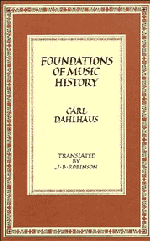Book contents
- Frontmatter
- Contents
- Translator's preface
- Foreword
- 1 Is history on the decline?
- 2 The significance of art: historical or aesthetic?
- 3 What is a fact of music history?
- 4 Does music history have a ‘subject’?
- 5 Historicism and tradition
- 6 Hermeneutics in history
- 7 The value-judgment: object or premise of history?
- 8 The ‘relative autonomy’ of music history
- 9 Thoughts on structural history
- 10 Problems in reception history
- Bibliography
- Index
6 - Hermeneutics in history
Published online by Cambridge University Press: 01 June 2011
- Frontmatter
- Contents
- Translator's preface
- Foreword
- 1 Is history on the decline?
- 2 The significance of art: historical or aesthetic?
- 3 What is a fact of music history?
- 4 Does music history have a ‘subject’?
- 5 Historicism and tradition
- 6 Hermeneutics in history
- 7 The value-judgment: object or premise of history?
- 8 The ‘relative autonomy’ of music history
- 9 Thoughts on structural history
- 10 Problems in reception history
- Bibliography
- Index
Summary
Verstehen, the principal methodological category of history in the nineteenth and early twentieth centuries, seems latterly to have fallen into disrepute. Modern historians with their predilection for social history no longer try primarily to account for the intentions, motives and ideas of historical agents, preferring instead to determine the trends and forces to which these agents were subject. Still, insufficient as the interpretation of intentions has proved to be as a basis for writing history, it is no less indisputable that we must understand the sense of an action before undertaking a causal or functional analysis of the conditions under which it came about and exercised its influence.
The Verstehen theory of history as developed in the nineteenth century was based, implicitly or explicitly, on the notion of an imaginary dialogue that the historian conducted with historical agents in an effort to discover their aims and motives. To keep this dialogue from degenerating into a cross-examination, an exchange of monologues, or mere palaver, certain conditions had to be observed which, despite or precisely because of their triviality, were not infrequently neglected and hence warrant discussion here. A dialogue, then, presupposes a common language, agreement on a matter in question, and an effort to understand the interlocutor as something more than a mere object of scrutiny: as an individual with a distinct personality.
- Type
- Chapter
- Information
- Foundations of Music History , pp. 71 - 85Publisher: Cambridge University PressPrint publication year: 1983



